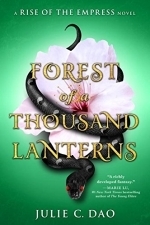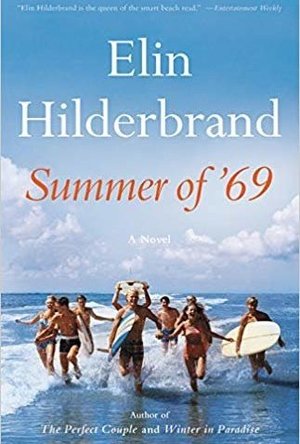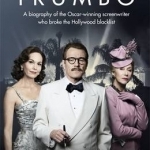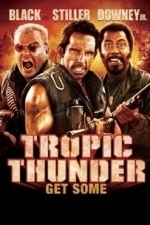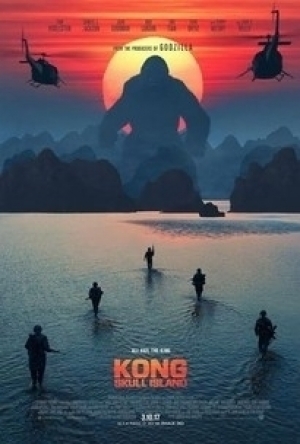Search
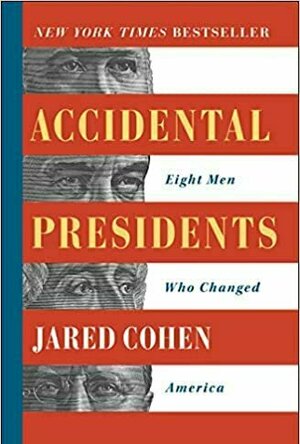
Accidental Presidents
Book
This New York Times bestselling "deep dive into the terms of eight former presidents is chock-full...
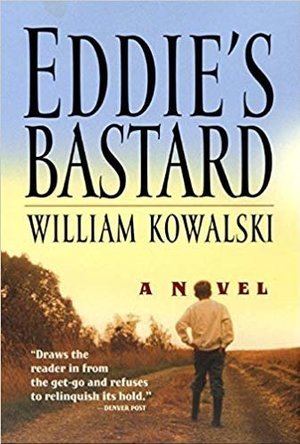
Eddie's Bastard
Book
In this rich, deeply resonant literary debut, twenty-eight-year-old William Kowalski explores the...
fiction literary fiction contemporary American
Goddess in the Stacks (553 KP) rated Forest of a Thousand Lanterns in Books
Jan 11, 2018
A fun blend of Fairy Tales and Asian mythology.
You know I love my Fairy Tales! Especially re-imagining the villains. Forest of a Thousand Lanterns is an Asian take on the evil queen from Snow White. The author is a Vietnamese American, and this is her debut novel. She has quite skillfully woven a new origin story for the wicked stepmother in a fantasy land heavily influenced by East Asian mythology and culture. I don't know enough about the individual countries' mythologies to tell you if the influences come specifically from Vietnam, or more generically from the area. I know that their beliefs can vary pretty wildly by locale.
That said, this is another superb debut novel. I'm eager to read the sequel - it's billed as "A Rise of the Empress novel" so I'm sure there will be one or more. Xifeng is a pretty complex character - she is somewhat single-minded in what she wants, but conflicted in what to do to get it. (It being the position of Empress.) I was intrigued by who was chosen to fill the roles of the traditional tale; Xifeng, of course, would be the wicked stepmother. The Fool is Xifeng's version of Snow White, and Xifeng thought for some time that she knew who The Fool was. The reader, of course, knows the Fool must be Snow White, and so not the people who Xifeng suspected. The one that surprised me was the identity of The Huntsman. I won't spoil anything - but he was unexpected.
There's also more going on than just the Snow White plot. There are gods and goddesses and spirits and an underlying war. I am quite eager to see how those play out.
There is a slow spot in the middle - I set the book down for a couple of days before picking it up again, and that's always a sign I'm not as absorbed in the book as I could be. But I did pick it up again and read straight through to the end, so it's not too bad!
If you like Fairy Tales and Asian mythology, this is definitely a neat blend of the two. I really liked it.
You can find all my reviews at http://goddessinthestacks.wordpress.com
That said, this is another superb debut novel. I'm eager to read the sequel - it's billed as "A Rise of the Empress novel" so I'm sure there will be one or more. Xifeng is a pretty complex character - she is somewhat single-minded in what she wants, but conflicted in what to do to get it. (It being the position of Empress.) I was intrigued by who was chosen to fill the roles of the traditional tale; Xifeng, of course, would be the wicked stepmother. The Fool is Xifeng's version of Snow White, and Xifeng thought for some time that she knew who The Fool was. The reader, of course, knows the Fool must be Snow White, and so not the people who Xifeng suspected. The one that surprised me was the identity of The Huntsman. I won't spoil anything - but he was unexpected.
There's also more going on than just the Snow White plot. There are gods and goddesses and spirits and an underlying war. I am quite eager to see how those play out.
There is a slow spot in the middle - I set the book down for a couple of days before picking it up again, and that's always a sign I'm not as absorbed in the book as I could be. But I did pick it up again and read straight through to the end, so it's not too bad!
If you like Fairy Tales and Asian mythology, this is definitely a neat blend of the two. I really liked it.
You can find all my reviews at http://goddessinthestacks.wordpress.com
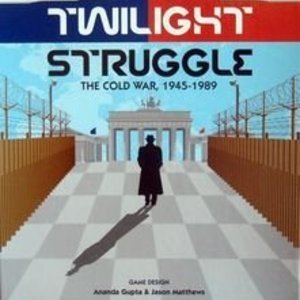
Twilight Struggle
Tabletop Game
"Now the trumpet summons us again, not as a call to bear arms, though arms we need; not as a call to...
Boardgames 2playergames PoliticalGames HistoricalGames

Walden by Henry David Thoreau
Podcast
Two years, two months and two days! This is what forms the time line of one man's quest for the...
Kristy H (1252 KP) rated Summer of '69 in Books
Aug 23, 2019
Every year Kate Levin and her family spend the summer on Nantucket with Kate's mother, Exalta. But this summer is different. Kate's eldest, Blair, 24, is now married to a MIT professor named Angus Whalen and they're expecting their first baby in August. As such, Blair won't be on Nantucket this summer. Middle sister, Kirby, is a junior in college and spending the summer on Martha's Vineyard. Her only son, Tiger, recently deployed to Vietnam, which has left Kate feeling completely panicked and lost. Only her youngest, thirteen-year-old, Jessie, makes the trip. But without her siblings, Jessie feels overlooked and ignored. It's the historic summer of '69--and Levin family will have some memorable experiences of their own, too.
I just love Elin Hilderbrand's books and this was a really fun one. It didn't feel that much like "historical fiction," despite the 1969 setting, but it was fascinating to get a glimpse of how the late 1960s affected the family and their decisions--especially the females. The time period affects each woman, even Jessie, in their own way. Mom Kate was a tough one to love, at times, ignoring her poor daughter and moaning about Tiger and her own past. But, man, Hilderbrand just comes up with the best family dynamics. She sets an amazing scene, aided by her beloved Nantucket, and before you know it, you are there with her characters, immersed in their drama and daily lives.
For me, the star of this one was young Jessie. I loved how much of the book revolved around her--the points of view vary, but we hear from her a lot, and I couldn't help but love the kid. Nothing like growing up with a slightly absent mom, domineering grandmother, and a bunch of way older siblings, one of whom is at war. She was a breath of fresh air, and of course, Hilderbrand wrote from a teenage point of view perfectly. She gives all Kate's daughters their own unique voice, and it's amazing how each character stands out easily as distinct from one another.
This is not "simply" a tale of a family over a summer, it's captivating and engaging look at a family shaped by historical and domestic circumstances. I certainly enjoyed this novel and would definitely recommend it. I usually shy away from historical fiction, but I found it quite interesting--great characters and family dynamics as always from our summer novel queen. 4 stars.
I just love Elin Hilderbrand's books and this was a really fun one. It didn't feel that much like "historical fiction," despite the 1969 setting, but it was fascinating to get a glimpse of how the late 1960s affected the family and their decisions--especially the females. The time period affects each woman, even Jessie, in their own way. Mom Kate was a tough one to love, at times, ignoring her poor daughter and moaning about Tiger and her own past. But, man, Hilderbrand just comes up with the best family dynamics. She sets an amazing scene, aided by her beloved Nantucket, and before you know it, you are there with her characters, immersed in their drama and daily lives.
For me, the star of this one was young Jessie. I loved how much of the book revolved around her--the points of view vary, but we hear from her a lot, and I couldn't help but love the kid. Nothing like growing up with a slightly absent mom, domineering grandmother, and a bunch of way older siblings, one of whom is at war. She was a breath of fresh air, and of course, Hilderbrand wrote from a teenage point of view perfectly. She gives all Kate's daughters their own unique voice, and it's amazing how each character stands out easily as distinct from one another.
This is not "simply" a tale of a family over a summer, it's captivating and engaging look at a family shaped by historical and domestic circumstances. I certainly enjoyed this novel and would definitely recommend it. I usually shy away from historical fiction, but I found it quite interesting--great characters and family dynamics as always from our summer novel queen. 4 stars.
Film tie-in
I received this book for free through Goodreads First Reads.
Nominated for an Oscar, BAFTA and Golden Globe,Trumbo is a recent film based on the original biography Dalton Trumbo written by Bruce Cook in 1977. Its adaptation to film provided the perfect opportunity to republish this extremely well researched book. With a forward written by John McNamara, the screenwriter of the motion picture, the story of Dalton Trumbo’s life is just as intriguing as it was almost forty years ago. But who is Trumbo?
If, like me, you have never heard of Trumbo or even the infamous “Hollywood Ten,” it may take a while for it to become clear as to why it was worth Cook’s time to produce a book about the man. Dalton Trumbo was a well-known screenwriter of films such as Papillon, Lonely Are The Brave and Roman Holiday as well as author of the novel Johnny Got His Gun. However these are not all he is famous for. During his life, Trumbo became a member of the Communist Party, which Hollywood branded as an Un-American Activity and thus blacklisted him, as well as other screenwriters, directors and actors. Ten of these men, Trumbo included, were imprisoned for their political beliefs – yet nothing prevented Trumbo from continuing his fairly successful career.
Interestingly, Cook begins the book with the final stages of Trumbo’s life. At time of writing Trumbo was still alive, although rather poorly. After contracting lung cancer, having a lung removed, and suffering a heart attack, Trumbo was a very sick man; nonetheless he was still enthusiastic about being interviewed and telling his personal story.
From his childhood, to his evening shifts at a bakery, Cook details Trumbo’s early life, emphasizing the hard upbringing he had before he found himself in the world of Hollywood. Although roughly 75% of the book focuses on Trumbo’s career, Cook highlights Trumbo as a family man, with both a wife and three children who he absolutely adores.
Cook constantly refers to the Hollywood Ten as a concept that the reader should already be familiar with. Granted, someone who picks up this book is more likely to do so having a prior interest in the central figure, and thus already know about his background; however those ignorant on the topic eventually gather a better understanding on the topic once reaching the relevant chapters. It also becomes clearer why Trumbo is worth reading/writing about – he may have been blacklisted, but he managed to break through all the barriers and reinstate his name and many others.
Reading this half a century after the event, it seems strange that Trumbo was imprisoned. He had not done anything intrinsically wrong, it was purely prejudice against his political beliefs that got him into the mess he found himself. But when you consider the events of the time: World War Two, the Cold War, the Korean War, and Vietnam; it is understandable why many feared those who claimed to be Communists.
Cook’s narrative does not flow as a story, and much of it is broken up with quotes from various people he interviewed. The timeline jumps about between past and present (1970s), which occasionally gets a bit confusing. A large part of the book is spent analyzing many of Trumbo’s works – both for screen and written formats – which, unless you have a particular interest, can be a little tedious.
It has got to be said that Bruce Cook was an exemplary writer with a great eye for detail. He did not jump to conclusions or only talk about things from his point of view. Instead he interviewed, what seems like, everyone who ever met Trumbo, and based his writing on fact backed up with numerous quotes and citations.
This edition of Trumbo contains a selection of photographs taken on the set of the movie. Disappointingly it does not contain any of Trumbo himself – you would think that some photos could have been tracked down!
Trumbo is not a book that will interest everyone. Most people today – particularly in England – will probably be unaware of who Dalton Trumbo was, and thus would only seek out this publication due to a fascination with film production. I have not seen the film, but after reading this and discovering how books go from novels, to screenplays to moving image, it would be interesting to find out which parts of Trumbo’s life made it onto the big screen.
Nominated for an Oscar, BAFTA and Golden Globe,Trumbo is a recent film based on the original biography Dalton Trumbo written by Bruce Cook in 1977. Its adaptation to film provided the perfect opportunity to republish this extremely well researched book. With a forward written by John McNamara, the screenwriter of the motion picture, the story of Dalton Trumbo’s life is just as intriguing as it was almost forty years ago. But who is Trumbo?
If, like me, you have never heard of Trumbo or even the infamous “Hollywood Ten,” it may take a while for it to become clear as to why it was worth Cook’s time to produce a book about the man. Dalton Trumbo was a well-known screenwriter of films such as Papillon, Lonely Are The Brave and Roman Holiday as well as author of the novel Johnny Got His Gun. However these are not all he is famous for. During his life, Trumbo became a member of the Communist Party, which Hollywood branded as an Un-American Activity and thus blacklisted him, as well as other screenwriters, directors and actors. Ten of these men, Trumbo included, were imprisoned for their political beliefs – yet nothing prevented Trumbo from continuing his fairly successful career.
Interestingly, Cook begins the book with the final stages of Trumbo’s life. At time of writing Trumbo was still alive, although rather poorly. After contracting lung cancer, having a lung removed, and suffering a heart attack, Trumbo was a very sick man; nonetheless he was still enthusiastic about being interviewed and telling his personal story.
From his childhood, to his evening shifts at a bakery, Cook details Trumbo’s early life, emphasizing the hard upbringing he had before he found himself in the world of Hollywood. Although roughly 75% of the book focuses on Trumbo’s career, Cook highlights Trumbo as a family man, with both a wife and three children who he absolutely adores.
Cook constantly refers to the Hollywood Ten as a concept that the reader should already be familiar with. Granted, someone who picks up this book is more likely to do so having a prior interest in the central figure, and thus already know about his background; however those ignorant on the topic eventually gather a better understanding on the topic once reaching the relevant chapters. It also becomes clearer why Trumbo is worth reading/writing about – he may have been blacklisted, but he managed to break through all the barriers and reinstate his name and many others.
Reading this half a century after the event, it seems strange that Trumbo was imprisoned. He had not done anything intrinsically wrong, it was purely prejudice against his political beliefs that got him into the mess he found himself. But when you consider the events of the time: World War Two, the Cold War, the Korean War, and Vietnam; it is understandable why many feared those who claimed to be Communists.
Cook’s narrative does not flow as a story, and much of it is broken up with quotes from various people he interviewed. The timeline jumps about between past and present (1970s), which occasionally gets a bit confusing. A large part of the book is spent analyzing many of Trumbo’s works – both for screen and written formats – which, unless you have a particular interest, can be a little tedious.
It has got to be said that Bruce Cook was an exemplary writer with a great eye for detail. He did not jump to conclusions or only talk about things from his point of view. Instead he interviewed, what seems like, everyone who ever met Trumbo, and based his writing on fact backed up with numerous quotes and citations.
This edition of Trumbo contains a selection of photographs taken on the set of the movie. Disappointingly it does not contain any of Trumbo himself – you would think that some photos could have been tracked down!
Trumbo is not a book that will interest everyone. Most people today – particularly in England – will probably be unaware of who Dalton Trumbo was, and thus would only seek out this publication due to a fascination with film production. I have not seen the film, but after reading this and discovering how books go from novels, to screenplays to moving image, it would be interesting to find out which parts of Trumbo’s life made it onto the big screen.
My rating: 3.5
<i>I received this book for free through Goodreads First Reads.</i>
Nominated for an Oscar, BAFTA and Golden Globe, <i>Trumbo</i> is a recent film based on the original biography <i>Dalton Trumbo</i> written by Bruce Cook in 1977. Its adaptation to film provided the perfect opportunity to republish this extremely well researched book. With a forward written by John McNamara, the screenwriter of the motion picture, the story of Dalton Trumbo’s life is just as intriguing as it was almost forty years ago. But who is Trumbo?
If, like me, you have never heard of Trumbo or even the infamous “Hollywood Ten,” it may take a while for it to become clear as to why it was worth Cook’s time to produce a book about the man. Dalton Trumbo was a well-known screenwriter of films such as <i>Papillon, Lonely Are The Brave</i> and <i>Roman Holiday</i> as well as author of the novel <i>Johnny Got His Gun</i>. However these are not all he is famous for. During his life, Trumbo became a member of the Communist Party, which Hollywood branded as an Un-American Activity and thus blacklisted him, as well as other screenwriters, directors and actors. Ten of these men, Trumbo included, were imprisoned for their political beliefs – yet nothing prevented Trumbo from continuing his fairly successful career.
Interestingly, Cook begins the book with the final stages of Trumbo’s life. At time of writing Trumbo was still alive, although rather poorly. After contracting lung cancer, having a lung removed, and suffering a heart attack, Trumbo was a very sick man; nonetheless he was still enthusiastic about being interviewed and telling his personal story.
From his childhood, to his evening shifts at a bakery, Cook details Trumbo’s early life, emphasizing the hard upbringing he had before he found himself in the world of Hollywood. Although roughly 75% of the book focuses on Trumbo’s career, Cook highlights Trumbo as a family man, with both a wife and three children who he absolutely adores.
Cook constantly refers to the Hollywood Ten as a concept that the reader should already be familiar with. Granted, someone who picks up this book is more likely to do so having a prior interest in the central figure, and thus already know about his background; however those ignorant on the topic eventually gather a better understanding on the topic once reaching the relevant chapters. It also becomes clearer why Trumbo is worth reading/writing about – he may have been blacklisted, but he managed to break through all the barriers and reinstate his name and many others.
Reading this half a century after the event, it seems strange that Trumbo was imprisoned. He had not done anything intrinsically wrong, it was purely prejudice against his political beliefs that got him into the mess he found himself. But when you consider the events of the time: World War Two, the Cold War, the Korean War, and Vietnam; it is understandable why many feared those who claimed to be Communists.
Cook’s narrative does not flow as a story, and much of it is broken up with quotes from various people he interviewed. The timeline jumps about between past and present (1970s), which occasionally gets a bit confusing. A large part of the book is spent analyzing many of Trumbo’s works – both for screen and written formats – which, unless you have a particular interest, can be a little tedious.
It has got to be said that Bruce Cook was an exemplary writer with a great eye for detail. He did not jump to conclusions or only talk about things from his point of view. Instead he interviewed, what seems like, everyone who ever met Trumbo, and based his writing on fact backed up with numerous quotes and citations.
This edition of <i>Trumbo</i> contains a selection of photographs taken on the set of the movie. Disappointingly it does not contain any of Trumbo himself – you would think that some photos could have been tracked down!
<i>Trumbo</i> is not a book that will interest everyone. Most people today – particularly in England – will probably be unaware of who Dalton Trumbo was, and thus would only seek out this publication due to a fascination with film production. I have not seen the film, but after reading this and discovering how books go from novels, to screenplays to moving image, it would be interesting to find out which parts of Trumbo’s life made it onto the big screen.
<i>I received this book for free through Goodreads First Reads.</i>
Nominated for an Oscar, BAFTA and Golden Globe, <i>Trumbo</i> is a recent film based on the original biography <i>Dalton Trumbo</i> written by Bruce Cook in 1977. Its adaptation to film provided the perfect opportunity to republish this extremely well researched book. With a forward written by John McNamara, the screenwriter of the motion picture, the story of Dalton Trumbo’s life is just as intriguing as it was almost forty years ago. But who is Trumbo?
If, like me, you have never heard of Trumbo or even the infamous “Hollywood Ten,” it may take a while for it to become clear as to why it was worth Cook’s time to produce a book about the man. Dalton Trumbo was a well-known screenwriter of films such as <i>Papillon, Lonely Are The Brave</i> and <i>Roman Holiday</i> as well as author of the novel <i>Johnny Got His Gun</i>. However these are not all he is famous for. During his life, Trumbo became a member of the Communist Party, which Hollywood branded as an Un-American Activity and thus blacklisted him, as well as other screenwriters, directors and actors. Ten of these men, Trumbo included, were imprisoned for their political beliefs – yet nothing prevented Trumbo from continuing his fairly successful career.
Interestingly, Cook begins the book with the final stages of Trumbo’s life. At time of writing Trumbo was still alive, although rather poorly. After contracting lung cancer, having a lung removed, and suffering a heart attack, Trumbo was a very sick man; nonetheless he was still enthusiastic about being interviewed and telling his personal story.
From his childhood, to his evening shifts at a bakery, Cook details Trumbo’s early life, emphasizing the hard upbringing he had before he found himself in the world of Hollywood. Although roughly 75% of the book focuses on Trumbo’s career, Cook highlights Trumbo as a family man, with both a wife and three children who he absolutely adores.
Cook constantly refers to the Hollywood Ten as a concept that the reader should already be familiar with. Granted, someone who picks up this book is more likely to do so having a prior interest in the central figure, and thus already know about his background; however those ignorant on the topic eventually gather a better understanding on the topic once reaching the relevant chapters. It also becomes clearer why Trumbo is worth reading/writing about – he may have been blacklisted, but he managed to break through all the barriers and reinstate his name and many others.
Reading this half a century after the event, it seems strange that Trumbo was imprisoned. He had not done anything intrinsically wrong, it was purely prejudice against his political beliefs that got him into the mess he found himself. But when you consider the events of the time: World War Two, the Cold War, the Korean War, and Vietnam; it is understandable why many feared those who claimed to be Communists.
Cook’s narrative does not flow as a story, and much of it is broken up with quotes from various people he interviewed. The timeline jumps about between past and present (1970s), which occasionally gets a bit confusing. A large part of the book is spent analyzing many of Trumbo’s works – both for screen and written formats – which, unless you have a particular interest, can be a little tedious.
It has got to be said that Bruce Cook was an exemplary writer with a great eye for detail. He did not jump to conclusions or only talk about things from his point of view. Instead he interviewed, what seems like, everyone who ever met Trumbo, and based his writing on fact backed up with numerous quotes and citations.
This edition of <i>Trumbo</i> contains a selection of photographs taken on the set of the movie. Disappointingly it does not contain any of Trumbo himself – you would think that some photos could have been tracked down!
<i>Trumbo</i> is not a book that will interest everyone. Most people today – particularly in England – will probably be unaware of who Dalton Trumbo was, and thus would only seek out this publication due to a fascination with film production. I have not seen the film, but after reading this and discovering how books go from novels, to screenplays to moving image, it would be interesting to find out which parts of Trumbo’s life made it onto the big screen.
Gareth von Kallenbach (980 KP) rated Tropic Thunder (2008) in Movies
Aug 14, 2019
Deep in the jungles of Vietnam, one of the most expensive films in history is underway. The film is based upon a best seller by war hero Four Leaf Tayback (Nick Nolte), and stars three of the biggest stars in Hollywood so naturally expectations are very high for the film to become a box office blockbuster.
Unfortunately the production is troubled by one gaffe after another and finds itself lost in budget over runs, issues amongst the stars, and more drama than a Shakespeare festival.
The film is “Tropical Thunder” and Director and star Ben Stiller has assembled a talented cast that includes Jack Black and Robert Downey Jr. in a biting satire of the Hollywood machine.
Stiller stars as Tugg Speedman, a declining action star who sees the war film as his big chance to break away from his recent failures and move into more serious work. Tugg is overshadowed by the presence of multiple Oscar winner Kirk Lazarus (Robert Downey Jr.), who prepares for a part so intensely that he literally becomes the character he is portraying. Toward that end, he has undergone a skin pigment procedure in order to portray an African American soldier.
Rounding out the group, literally, is Jeff Portnoy (Jack Black), the star of flatulence based film comedy series and a man wracked by addiction to the point that he hides his drugs in a candy package and refers to them as his jelly beans.
After a staggeringly costly and impressive pyrotechnic display by the sets explosive expert Cody (Danny Mc Bride), the film is in danger of being halted by the money behind the film, an intensely angry Producer named Les Grossman (Tom Cruise).
In an effort to keep his film alive and salvage their careers, Four Leaf and the film’s Director decide to drop the cast in the thick of the jungle and shoot the film gorilla style with hidden cameras and various tricks to produce a grittier film and get the cast to start acting like the soldiers they are supposed to be portraying.
In a hilarious turn of events, the cast ends up trapped in the jungle and surrounded by members of the locale drug cartel. Convinced that it is all part of the film, Tugg and company blindly trudge along thinking all is going as scripted until things go hopelessly wrong, and force the cast to come to grips with the situation as well as their fragile egos and personal issues.
While the premise of the film is solid, and there are a good number of laughs in the film, for the most part “Tropic Thunder” is a hit or miss venture.
Robert Downey Jr. is amazing in his portrayal as he constantly steals his scenes with his expressions and one liners and almost single handled carries the film during some of the more tedious moments.
Stiller plays the patented Stiller character once again, the slow witted loser with a heart of gold, and despite his efforts, he is just not given enough material to fully push his character over the top, despite some funny moments.
The biggest disappointment for me was Jack Black who is sadly underused in the film. Jack is a very gifted and talented actor but he is given very little to work with, and precious few moments to let his talents shine. Owen Wilson was originally supposed to be in the film, and at times it seems that this part was written more with Wilson’s more subdued style of humor in mind.
Aside from the laughs, the film does have an abundance of celebrity cameos, and this truly helps the film. Sadly though, the plot really does not do justice to the premise nor talent in the film, and unfolds in a very unspectacular manner that had me expecting more.
This is not to say it is a bad film as I found myself laughing on more than one occasion, sadly it became fewer and father between laughs as the film unfolded to a very disappointing finale.
Unfortunately the production is troubled by one gaffe after another and finds itself lost in budget over runs, issues amongst the stars, and more drama than a Shakespeare festival.
The film is “Tropical Thunder” and Director and star Ben Stiller has assembled a talented cast that includes Jack Black and Robert Downey Jr. in a biting satire of the Hollywood machine.
Stiller stars as Tugg Speedman, a declining action star who sees the war film as his big chance to break away from his recent failures and move into more serious work. Tugg is overshadowed by the presence of multiple Oscar winner Kirk Lazarus (Robert Downey Jr.), who prepares for a part so intensely that he literally becomes the character he is portraying. Toward that end, he has undergone a skin pigment procedure in order to portray an African American soldier.
Rounding out the group, literally, is Jeff Portnoy (Jack Black), the star of flatulence based film comedy series and a man wracked by addiction to the point that he hides his drugs in a candy package and refers to them as his jelly beans.
After a staggeringly costly and impressive pyrotechnic display by the sets explosive expert Cody (Danny Mc Bride), the film is in danger of being halted by the money behind the film, an intensely angry Producer named Les Grossman (Tom Cruise).
In an effort to keep his film alive and salvage their careers, Four Leaf and the film’s Director decide to drop the cast in the thick of the jungle and shoot the film gorilla style with hidden cameras and various tricks to produce a grittier film and get the cast to start acting like the soldiers they are supposed to be portraying.
In a hilarious turn of events, the cast ends up trapped in the jungle and surrounded by members of the locale drug cartel. Convinced that it is all part of the film, Tugg and company blindly trudge along thinking all is going as scripted until things go hopelessly wrong, and force the cast to come to grips with the situation as well as their fragile egos and personal issues.
While the premise of the film is solid, and there are a good number of laughs in the film, for the most part “Tropic Thunder” is a hit or miss venture.
Robert Downey Jr. is amazing in his portrayal as he constantly steals his scenes with his expressions and one liners and almost single handled carries the film during some of the more tedious moments.
Stiller plays the patented Stiller character once again, the slow witted loser with a heart of gold, and despite his efforts, he is just not given enough material to fully push his character over the top, despite some funny moments.
The biggest disappointment for me was Jack Black who is sadly underused in the film. Jack is a very gifted and talented actor but he is given very little to work with, and precious few moments to let his talents shine. Owen Wilson was originally supposed to be in the film, and at times it seems that this part was written more with Wilson’s more subdued style of humor in mind.
Aside from the laughs, the film does have an abundance of celebrity cameos, and this truly helps the film. Sadly though, the plot really does not do justice to the premise nor talent in the film, and unfolds in a very unspectacular manner that had me expecting more.
This is not to say it is a bad film as I found myself laughing on more than one occasion, sadly it became fewer and father between laughs as the film unfolded to a very disappointing finale.
Gareth von Kallenbach (980 KP) rated Kong: Skull Island (2017) in Movies
Jun 19, 2019
The legendary King Kong returns in an all new adventure that gives the classic tale a much needed update and new setting. Unlike Perter Jackson’s retelling of the original Black and White film, “Kong: Skull Island” eschews the old for the new and in doing so breathes a much needed new life and vitality into the franchise.
The film is set in 1973 when William Randa (John Goodman), informs the government that they have detected a previously unknown island and need to investigate it before the Soviets learn of it and beat them to whatever the island my hold.
William recruits a team which includes a former British officer named James Conrad (Tom Hiddleston), and Photographer Mason Weaver (Brie Larson), to assist his team lead by Houston Brooks (Corey Hawkins), in mapping the island.
William also asks for a military escort and the government enlists Lt. Colonel Preston Packard (Samuel L. Jackson), and his team to accompany the mission. Packard is trying to find his place in the world as he and his helicopter combat team are dealing with the recent end of the Vietnam War. His men are looking forward to going home and resuming their lives, but a dour Packard jumps at the chance for another mission over the uncertainty of the future.
Upon arriving on the mysterious island and starting their survey mission by using seismic charges, the team attract the attention of Kong who is not at all pleased with the intrusion on his island. Kong makes short work of the copters and the team finds themselves scattered about the dangerous island. They soon learn that Kong is not the only danger on the island and must find a way to rejoin each other and make it to their extraction point alive.
Naturally some of the characters have a hidden agenda and there are dangerous and action around every corner. Further complicating matters is the appearance of Marlow (John C. Reilly), a downed WWII pilot who has been stranded on the island for 23 years and warns of dangers far greater than Kong that are ahead of the team.
The film combines a solid cast with state of the art special effects to take a new twist on the standard adventure fare. While many parts of the film remain silly Popcorn entertainment, the quality of the assembled cast allows the film to move beyond being just an assembly of potential victims for a menagerie of CGI creatures to dispatch.
While the story is more in lines with the linear and thin plots of adventure films of old, the sum of the parts does add up to an enjoyable film experience for those who like the giant creature films. You will want to make sure to stay after the credits as there is a very good scene that shows a setup for a future film that had those in attendance at our press screening cheering.
The film may be a bit intense for younger viewers but if you are looking for a touch of nostalgia and action, you may find the film just what you need.
http://sknr.net/2017/03/08/kong-skull-island/
The film is set in 1973 when William Randa (John Goodman), informs the government that they have detected a previously unknown island and need to investigate it before the Soviets learn of it and beat them to whatever the island my hold.
William recruits a team which includes a former British officer named James Conrad (Tom Hiddleston), and Photographer Mason Weaver (Brie Larson), to assist his team lead by Houston Brooks (Corey Hawkins), in mapping the island.
William also asks for a military escort and the government enlists Lt. Colonel Preston Packard (Samuel L. Jackson), and his team to accompany the mission. Packard is trying to find his place in the world as he and his helicopter combat team are dealing with the recent end of the Vietnam War. His men are looking forward to going home and resuming their lives, but a dour Packard jumps at the chance for another mission over the uncertainty of the future.
Upon arriving on the mysterious island and starting their survey mission by using seismic charges, the team attract the attention of Kong who is not at all pleased with the intrusion on his island. Kong makes short work of the copters and the team finds themselves scattered about the dangerous island. They soon learn that Kong is not the only danger on the island and must find a way to rejoin each other and make it to their extraction point alive.
Naturally some of the characters have a hidden agenda and there are dangerous and action around every corner. Further complicating matters is the appearance of Marlow (John C. Reilly), a downed WWII pilot who has been stranded on the island for 23 years and warns of dangers far greater than Kong that are ahead of the team.
The film combines a solid cast with state of the art special effects to take a new twist on the standard adventure fare. While many parts of the film remain silly Popcorn entertainment, the quality of the assembled cast allows the film to move beyond being just an assembly of potential victims for a menagerie of CGI creatures to dispatch.
While the story is more in lines with the linear and thin plots of adventure films of old, the sum of the parts does add up to an enjoyable film experience for those who like the giant creature films. You will want to make sure to stay after the credits as there is a very good scene that shows a setup for a future film that had those in attendance at our press screening cheering.
The film may be a bit intense for younger viewers but if you are looking for a touch of nostalgia and action, you may find the film just what you need.
http://sknr.net/2017/03/08/kong-skull-island/
